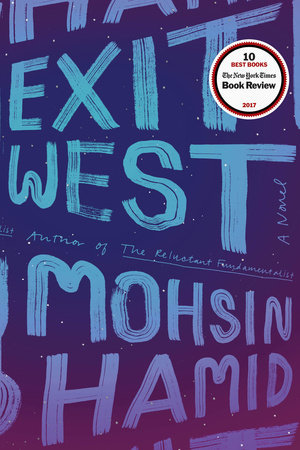I have read and enjoyed a few of Mohsin Hamid's novels on audiobook, and Exit West was no exception. The spare, sparse writing style that somehow builds to create beautiful, moving stories is present once more. Exit West is a novel about refugees and the impact of global migration on both the individuals and the world at large, and it's absolutely excellent.
Saeed and Nadia meet in an unnamed city, in an unnamed country. They become friends and fall in love, slowly and then hurriedly, as war overtakes their lives. They escape to Mykonos, and then to London, and then to San Francisco, through magical doorways that open up to people who can pay the price of entry.
Some people may be upset that Hamid reduces the entire exhausting, painful journey from a country in crisis to a country of refuge to the simple act of stepping through a doorway. After all, the decision to leave home is difficult, and then the trip from one place to another is often dangerous and horrible. But Hamid is not as interested in the process of becoming a refugee as on the impacts of being a refugee, or the impact of living in a world in which huge numbers of people migrate based on crises. Thus, Saeed and Nadia step over an edge and escape the physicality of their city, but they don't escape much else.
Exit West is an obviously timely novel in that it is about refugees. But timeliness in a story doesn't really matter if it doesn't stick; and in a story about refugees, it doesn't stick if it doesn't haunt you. I don't know if haunt is even the right word, but it is very difficult to read this novel without being just as consumed by the "what ifs?" as the characters are. What if I had never left? What if I brought my father with me? What if I had never met the person I escaped with? What if we escaped somewhere else? What would my life be like if war had never happened? What would I be like if war had never happened? It's impossible to know and equally impossible not to speculate.
Nadia is a confident, independent woman who adopts Saeed's family as her own and then has trouble removing herself from it. Saeed is an introspective, kind man who turns more and more to religion as he loses control of the trajectory of his life. They begin the story with so much promise and love and kindness for each other, but the stress of their lives causes both of them to draw back and recede from the other, to seek out friendship and understanding from others.
But there are other ways that people are impacted by the refugee crisis, and Hamid gives us brief snapshots of these lives before pulling away again. We see two old men fall in love over a piece of art. We see a man remake his life after contemplating suicide. We see, terrifyingly, a man follow two young women down the street as he strokes the knife in his pocket.
Exit West shows us how global migration can result in changes both profound and minimal to individuals, societies, and geographies. I loved how personal this story felt, from both Saeed's and Nadia's perspectives, and yet how easy it was to see just how much crises in completely foreign places can change people's behaviors here and everywhere. Definitely a book to read when you want to remind yourself of how important it is to remember that people are individuals, not statistics.

I so want to read this one. And, now, even more. In an interview with him recently, talk of his first novel Moth Smoke made me want to give that one a try too. However, it's also nice to know that there's a "really good one" waiting. (Okay, there's no shortage of that, is there.)
ReplyDelete